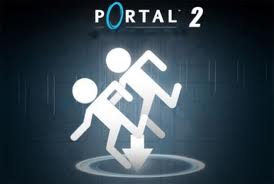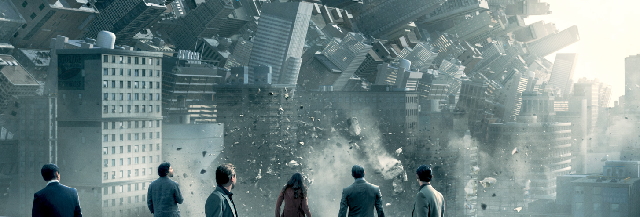It’s amazing what you can do when you put your mind to something. One minute I’ve decided that I need to pull finger and finish Saints Row The Third and the next, I’m staring at the closing credits. Admittedly, it’s not a long game, but I also find it difficult to push myself through any “entertainment” I’m not enjoying. There’s nothing deep and meaningful here: SR3 continues to succeed in its predecessor’s goal to escalate the levels of parody and hilarity and generally succeeds.
Category: Reviews
Portal 2 – Bigger, badder, bloated
 It seems to me that Valve saw the pop culture success of the original Portal and played to that. Great for marketing, fantastic for sales, but great for making a sequel? I don’t think so.
It seems to me that Valve saw the pop culture success of the original Portal and played to that. Great for marketing, fantastic for sales, but great for making a sequel? I don’t think so.
The main attraction to the game seems to be the storyline, which makes up the majority of the game. There are interminably long parts of the game that are death by expositional voiceover. All about the founding and original work performed at Aperture Science. It even provides two-by-four sized hints about the origins of GLaDOS, and explains her motivation for constant testing.
All that left me asking but one question: why did I need that? The best stories are the ones that leave things unsaid. Fill in the blanks, and let your audience make things up. As Yahtzee puts it:
Portal 1 was as tight as a walnet corset; not an inch of it was wasted… Portal 2 is a sightseeing tour that begrudgingly has a puzzle game in it.
I may be in the minority, but I found that despite the increased length (I finished Portal 2 in twelve hours, compared to the 4-or-so flash in the pan that was the first game), the levels flew by. I was genuinely stumped only once, at that was only two or three puzzles from the end. Call me rhetorical, but what’s the point of a puzzle game that doesn’t puzzle you?
I have to say that I’m astounded by the Metacritic score for the game. 95 is far too high for something that begins with what critics and fans agree is a perfect game and makes it longer, less funny and less challenging to the point of being laughable. The best writers know the value of a good editor lies in their ability to find things to cut out. Valve obviously hasn’t figured that out yet.
At once too ambitious and poorly executed. There are some big ideas which, even though Simmons may have planned from the first pages of “Hyperion”, don’t really fit the feel of the first half of the cycle. You can tell this is the case because there is far too much exposition that the characters teach each other about 3000 years of computer and human evolution that takes pages and pages of long hard reading and concentration on part of the reader. This sermon-like approach to world building actually holds back the plot that it seeks to reinforce and accelerate.
Originally eager to read this book because I was caught up in a good story that had flowed from the first two “Hyperion” novels, by the time I was done with “The Rise of Endymion” I was exhausted and glad that it was over. I always worry when an author has difficulty keeping the size of each novel in a series consistent. “Hyperion” is slim, compact, and well-edited. By the time Simmons reaches “The Rise of Endymion”, the book is at least three times as long and the reader is not given any more value for their investment of time.
Inception

Chris Nolan’s masterpiece Inception is much more than just your regular summer blockbuster, full of gunfights (there are plenty), explosions (there are a few), and ground breaking special effects (they abound) – it’s a thought-provoking investigation into the nature of dreams and the subconscious.
The film’s premise is that with the right skills and equipment, people can share each other’s dreams, building dreamscapes and populating them with their subconscious. While this can be put to a variety of uses, the more common one is “extraction” – a form of espionage where the subject’s subconscious is encouraged to put secret knowledge into a secure place like a safe or vault. The extracting team can then break in and steal that knowledge.
Cobb (Leonardo DiCapprio) leads a team of professional dreamthieves on a mission to do the reverse: to plant a thought that will change the subject’s behaviour in a specific way. This is a much harder task as it must be done in such a way that the subject believes it is their own idea, and not something foreign which can be rejected.
Of course, the difficulty is compounded because Cobb brings personal problems to the job. These problems can’t be avoided and will have a very profound effect on Cobb and everybody else in the dreamscape around him.
This is your spoiler warning: I intend to discuss some specifics beyond the jump.
About this time last year, I started watching a great new web series called Gold. In brief, it is about the trials and tribulations of two national-grade roleplaying teams as they prepare for the international championships of their chosen game, Goblins and Gold.
Once the first season was concluded, a call was put out to help fund a DVD run. Naturally, I wanted to help out a project that had given me plenty of entertainment, and doubly so since I am immersed in the local gaming culture of Sydney.
The Feature
It took a while (inevitable, given that the project didn’t have big studio backing), but I finally got my DVD in the mail. I sat down to watch the whole feature end-to-end and am still blown away by the truth that David Nett and his team have managed to captured. While many of the characters are deliberately written and performed to be larger than life, they draw easily on archetypes of both the gaming culture (speak Elvish much?) and pro sports (seriously, disfunctioning dice rolling hand?).
There’s also a constant reminder that while this is all glitz and glam for the players, the sport is still niche enough to get shut down when the competition for spectators ramps up. What I’m trying to say is that while GOLD is obviously fiction, it still rings true for me.
Special Features
While I haven’t had time to sit down with the commentary tracks yet (there are two of them!), I did watch the cast and crew interview with GirlGamer‘s Cricket Lee. There are some insightful observations and revelations in that interview, and it was warming to see that while a number of people went into the project as gamers, even more began gaming as a result.
Final Verdict
Look, the basic content is still available for free on the GOLD website so you can try before you buy. That being said, I think the DVD is a great thing to have. Purchasing it shows your support for a great project and helps the GOLD team make the case to financial backers that a second season is viable. I highly recommend it. Plus, you’ll also get a behind-the-scenes photo and GOLD collectible game card.